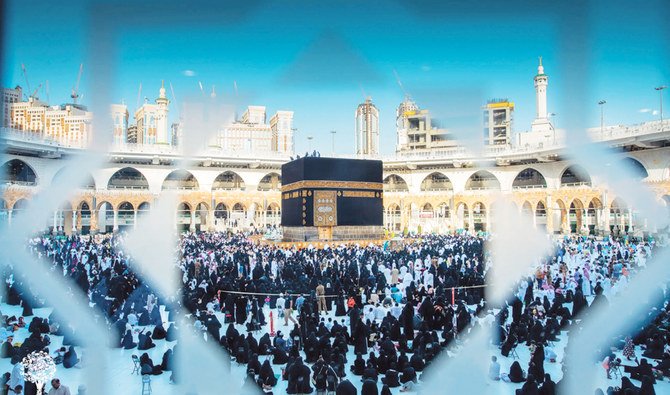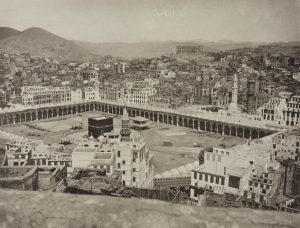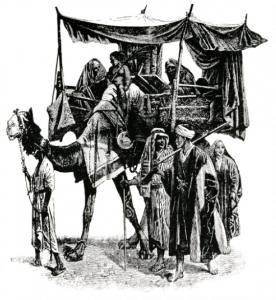
- ARAB NEWS
- 06 Jul 2025

JEDDAH/MAKKAH: At a time when millions of Muslims travel to the valley of Mina on the first day of Hajj, the women of Makkah head to the Grand Mosque to honor a pastime tradition only recently broken due to the COVID-19 pandemic.
The Day of Arafat, the holiest day in the Islamic lunar calendar, is dedicated to prayer and unity, and is a significant event for Muslims.
It is also a day that bears witness to a local phenomenon that has been practiced for ages. As millions of pilgrims head to Mount Arafat on the ninth day of Dul Hijjah, the official first day of Hajj, silence sweeps over Makkah, especially the Grand Mosque.
In mere hours, the floors of the Mataf around the Kaaba — once filled with people circumambulating in the white Ihram — is replaced with a mere handful of people, who are mostly women.
The phenomenon has been witnessed for as long as many can remember and is locally known as “Yawm Al-Kholeef,” derived from the Arabic word for “void” or “empty.”
When women and children head to the Grand Mosque, the men head five miles due east to Mina valley with the pilgrims.
Every year, Makkawis, known as “mutawefeen” across the city, prepare themselves for the Hajj season as soon as Eid Al-Fitr ends as they await pilgrims arriving from Jeddah through their ‘wukalaa’ or agents.
Women prepare their homes for welcoming and lodging their guests, who will stay for either a few days or up to four months, depending on the agreement between the mutawef, the wakeel, and the pilgrim.
“The relationship between pilgrims and mutawef is solid and is not controlled by economic interest,” Faten Hussein, a matawefa and journalist specializing in Hajj and Umrah, told Arab News.

“The relationship is rather governed by human, spiritual, and religious ties. The profession, for the first generation of mutawefeen, was handed down for generations and considered an honor for those who serve and assist the pilgrims, looking after their comfort.”
On the eighth day of Dul Hijjah, men across the city — old and young — gather the necessary food, tents and gear, before guiding the pilgrims from the Grand Mosque to Mina, where they will stay for the duration of Hajj before they move to Mount Arafat after dawn on the ninth, marking the day of Arafat.
“The mutawefeen would then take the pilgrims to the Grand Mosque while praying along the way.
“The mutawef’s sons and at times even his daughters would be walking in the back with the female pilgrims. This is to ensure that pilgrims stay with the group and do not get lost nor left behind,” said Hussein.
Until the recent closure of the Grand Mosque due to the pandemic, women often would gather their friends, family members, and neighbors, pack their food and gear and head to the mosque to spend the day praying while they wait for sundown to break their fast.
In Islamic tradition, abled Muslims who are not performing Hajj are recommended to fast on the day as “it expiates the sins of the preceding year and the coming year.”

After spending the whole day at the mosque dedicated to their prayers and supplications, preparations for Eid begin, with women heading to nearby souks to buy toys for the children of the family and sweets for visiting guests.
Today, women still take advantage of the empty mosque and head out to perform Umrah rituals or spend a day praying at the mosque, something that became an annual habit for many in Makkah and nearby cities.
Jeddah-based graphic designer Nedaa Zuhair told Arab News that in her childhood, she noticed her grandmother and aunts going to Makkah every year on Arafat Day as she spent the day at the house of an aunt who decided to stay back.
“Up until recently, I’ve noticed that more and more women would head to Makkah for the day.
“Though at times I prefer staying at home and spending a relaxing day in peace, I did happen to go a few times in the past years and even though it would be eerily quiet, especially knowing that millions of pilgrims from around the world are gathered just a mere few miles away, it was a special feeling,” she told Arab News.
“In 2011, I had an experience of a lifetime when I was walking around the Kaaba and when I looked to my left, I found that barely anyone was touching the kiswa.
“I was so focused on completing my rounds that I didn’t realize I had a chance and took it. I touched and leaned on the Kaaba for what seemed to be ages, I can’t describe the sense of calm I got and the spiritual connection I felt. I never got the chance to touch the kiswa again but it is a memory I cherish,” she said.
“I found that simple traditions such as Yawm Al-Kholeef are closer to the heart than ever before since we can’t go to the mosque without prior permission due to the pandemic.
“I think one day we’ll be able to go back and do it again and I’ll bring my young daughter along with me to get a sense of the day’s significance just like I had once with my grandmother,” added Zuhair.
After sundown, preparations for Eid commence. Trays of chocolates and sweets are readied, new clean clothes are hung, toys are stacked in a corner and decorations are on display as women return from the souks and market to add the final touches.
For three days, celebrations with close family and friends have been underway, but the work for the women is not done just yet.
Hussein explained that after the pilgrimage, the mutawefeen and pilgrims return home to a feast from the pilgrims’ land in their honor.
“In the late 19th century, a princess from Bhopal (an erstwhile princely state in India) told of her visit to Makkah and how she found the company of the guide’s women to be very enjoyable and important because it is founded on good treatment and great companionship,” said Hussein.
“The better the treatment the pilgrims receive from the mutawef’s family, the more famous the family becomes among the pilgrims, and the more pilgrims will come to visit them. It is a good means of advertisement for them among the people.”